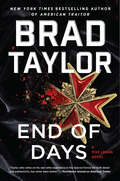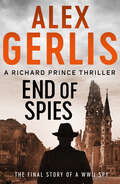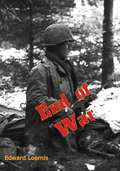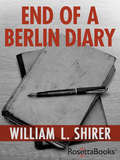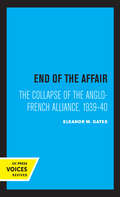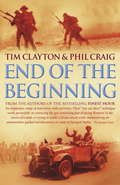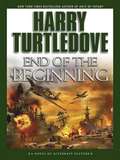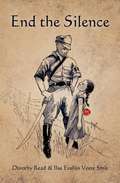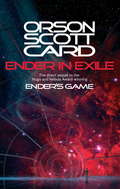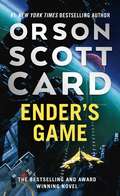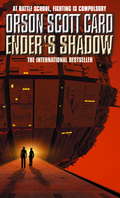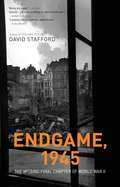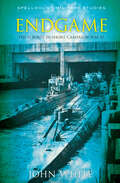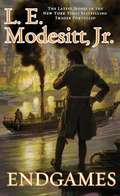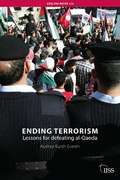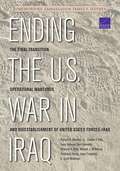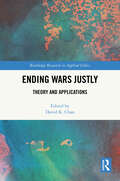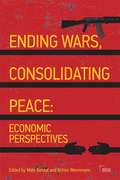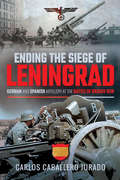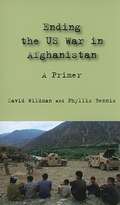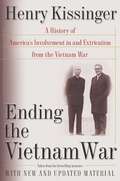- Table View
- List View
End of Days: A Pike Logan Novel (Pike Logan #16)
by Brad TaylorPike Logan must stop a deranged killer hell-bent on igniting an international conflagration in this explosive, action-packed thriller from New York Times bestselling author and former special forces officer, Brad Taylor.When a paragliding trip over the picturesque mountains of Switzerland results in the brutal murder of the former head of Israeli intelligence, Mossad brings in terrorist hunters Aaron and Shoshana to investigate. But they'll need help to find out who was behind the attack and what they’re planning next. Luckily, Aaron and Shoshana know exactly who to call.Taskforce operators Pike Logan and Jennifer Cahill have been trapped in Charleston, South Carolina during COVID-19, so when Aaron and Shoshana show up on their doorstep with Israeli passports and a new mission, they jump at the chance to assist their friends. Some suspect that Keta’ib Hezbollah, an Iranian-funded militia group operating in Iraq, might be responsible for the “accidental” deaths of key members of the American and Israeli governments. But something isn’t adding up, and Pike, Jennifer, and the two Mossad operators are determined to find the real assassins before more people are cut down.As they stumble upon the trail of a serial killer loose on the streets of Rome connected to the deaths and follow evidence leading to the exalted Knights of Malta, they must wade deep into the contentious religious and political fractures of Israel and the greater Middle East. It’s a dangerous world where fanatics and legitimate organizations exist side by side, and it’s up to the Taskforce to determine who is really pulling the strings. What they find could have disastrous consequences not only for them, but for the entire world…
End of Spies (Richard Prince Thrillers)
by Alex GerlisEurope, 1945: no longer at war but not yet at peace. The gripping finale to the bestselling Richard Prince espionage thrillers.British agent Richard Prince and the Danish spy Hanne Jakobsen come together for a vital mission: to find a Nazi war criminal responsible for the murder of fellow British agents.The hunt takes them on a perilous journey through Europe, a continent living on its nerves in the immediate aftermath of the Second World War. They unearth a secret Nazi escape line funded by British traitors – and it’s one which could lead them to Hitler’s trusted deputy, Martin Bormann.But when the Americans become involved it is no longer certain who’s on which side. Help might come in unlikely places. Can justice be found against the odds… Or are they too late?An unputdownable spy thriller with a twist you won’t see coming, this is the brilliant conclusion to Alex Gerlis' masterful Richard Prince spy thrillers, perfect for fans of John le Carréand Alan Furst.Praise for End of Spies'A page turning read, guaranteed to entertain' Evening Standard
End of War
by Edward LoomisHe came from Ohio. Young, unsure of himself, innocent. He came to Europe as an infantryman battling his way into the heart of Germany.There he stopped being unsure of himself. He stopped when he first went into battle and heard the singing of bullets close overhead, heard the crump of the four-inch mortars and saw the Tiger tanks rumbling towards him.He grew to maturity when he killed his first German and he stopped being innocent when he bought his first woman...for a bar of chocolate.When the war ended and the fighting died away, how was he to regain his lost innocence? How was he to lose the habits of a killer?There was no one to help him except Chrystel, the refugee with the body of a girl and the heart of a woman. No one but Chrystel...and himself.
End of a Berlin Diary
by William L. Shirer"When I came home from Berlin at Christmas time in 1940, I found most of my fellow countrymen unaware of what Hitler was really up to and somewhat confused as to how he had accomplished his evil designs. Some Americans didn't much care. Since it had been my lot to witness Europe's agony at first hand, I collected some of my notes in a book for the edification of such citizens as cared to read it. This book of notes is, in a way, a sequel to Berlin Diary. It is the end of my own small contribution to the Berlin story. There was a great deal, of course, that a reporter had not been able to learn in the frenzied Nazi capital beyond the Elbe. The sinister plots, the fateful decisions, that had plunged the world into such awful horror and misery had been made in secret. And what had really gone on in Germany after I left? Had defeat and collapse solved the German problem -- at least for the rest of our lifetime ? After the war's end I went back to Berlin to try to find out. I prowled the obscene ruins of the once proud capital and talked with the remnants of the Herrenvolk. At Nuremberg, amidst the debris of the lovely medieval town, I saw the surviving leaders of the Nazi gangster world, who had wielded such monstrous power so arrogantly when last I beheld them, finally brought to justice. Most important of all, I had access to a good part of the fourteen hundred tons of secret German documents that the Allies had captured intact. You will find the essential portions of many of them in this book. I have been content to let the German authors tell in their own inimitable words the dark and almost unbelievable tale of their savagery and deceit. Had these secret archives of the German government been destroyed, as the Nazis intended them to be, much of the truth about our weird period in history would have been buried forever. Now it is here for those who care to learn it. I have also tried to include in this book the thread of another story -- the story of the beginning of the Peace. Reader, you and I have already forgotten the fleeting moment of glory and man's magnificent sense of dedication the day peace descended on this wretched earth. I know that erring mortals cannot remain on the heights for long. But these notes, scribbled down at the time, may help to remind you that many on our side achieved those heights after the war's bloody struggles had brought out their inhuman courage, their bravery, and their wonderful fortitude."
End of a Berlin Diary
by William L. Shirer&“A vivid and unforgettable word picture of the destruction of Nazi Germany&” (The New York Times). A radio broadcaster and journalist for Edward R. Murrow at CBS, William L. Shirer was new to the world of broadcast journalism when he began keeping a diary while on assignment in Europe during the 1930s. It was in 1940, when he was still virtually unknown, that Shirer wondered whether his eyewitness account of the collapse of the world around Nazi Germany could be of any interest or value as a book. Shirer&’s Berlin Diary, which is considered the first full record of what was happening in Germany during the rise of the Third Reich, appeared in 1941. The book was an instant success—and would not be the last of his expert observations on Europe. Shirer returned to the European front in 1944 to cover the end of the war. As the smoke cleared, Shirer—who watched the birth of a monster that threatened to engulf the world—now stood witness to the death of the Third Reich. End of a Berlin Diary chronicles this year-long study of Germany after Hitler. Through a combination of Shirer&’s lucid, honest reporting, along with passages on the Nuremberg trials, copies of captured Nazi documents, and an eyewitness account of Hitler&’s last days, Shirer provides insight into the unrest, the weariness, and the tentative steps world leaders took towards peace.
End of the Affair: The Collapse of the Anglo-French Alliance, 1939 - 40
by Eleanor M. GatesThis title is part of UC Press's Voices Revived program, which commemorates University of California Press’s mission to seek out and cultivate the brightest minds and give them voice, reach, and impact. Drawing on a backlist dating to 1893, Voices Revived makes high-quality, peer-reviewed scholarship accessible once again using print-on-demand technology. This title was originally published in 1981.
End of the Beginning
by Phil Craig Tim Clayton1942 - British troops are stranded in the desert, struggling to hold back Rommel's Afrika Corps. Hitler's armies have reached Moscow, and there are murmurs of discontent at home as new doubts emerge about Churchill's leadership. Elsewhere in Europe there is chilling evidence of the mounting persecution of the Jews, stretching from Poland to the Channel Islands. For many, it seems there is little hope. As in their acclaimed bestseller FINEST HOUR, the authors use the personal testimony of ordinary people - In END OF THE BEGINNING we meet again some of the people first encountered in FINEST HOUR, and get to know many more. Troops fighting for Montgomery in the desert, RAF pilots bombing German towns, a young Jewish woman deported to Auschwitz from Guernsey, the reality of the Home Front - these stories and many more paint a vivid picture of human endeavour in time of war. And, sixty years on from the Battle of Alamein, END OF THE BEGINNING tells the controversial truth about one of the most famous battles in history - the importance of its lesser-known predecessor and the months of bitter in-fighting between the Allied generals. With precision and compassion, Phil Craig and Tim Clayton again debunk the myths and explore the realities of a crucial year in the history of Britain.
End of the Beginning (Pacific War Series #2)
by Harry TurtledoveSix weeks ago, Imperial Japanese military forces conquered and occupied the Hawaiian Islands. A puppet king sits on Hawaii's throne, his strings controlled by the general of the invasion force. American POWs, malnourished and weak, are enslaved as hard laborers until death takes them. Civilians fare little better, struggling to survive on dwindling resources. And families of Japanese origin find their loyalties divided. Meanwhile, across the United States, from Pensacola, Florida, to San Diego, California, the military is marshaling its forces. Steel factories and fuel refineries are operating around the clock. New recruits are enlisting, undergoing rigorous training exercises. All for the opportunity to strike back and drive the enemy from American soil...
End of the Game (Destroyer #60)
by Warren Murphy Richard SapirWhen a California Video game programmer gets board he begins manipulating people's lives for fun. When his boardom, leads him into an attempt at neuclear war, Remo is sent in to provide entertainmet.
End the Silence
by Dorothy Read Ilse Evelijn Veere SmitEnd the Silence tells the story of Ilse, an Indo-European born into an idyllic childhood in the colonial society of the Dutch East Indies. Ilse's privileged life was forever changed when the Japanese invaded her homeland during World War II. She recounts her years of internment in a Japanese concentration camp on Java. Then, at the war's end she walked out of Camp Halmaheira only to walk into the bloody Indonesian revolution where she was targeted for execution by native freedom fighters. Finally, she tells of the pain she suffered trying to cope with her memories in a family that refused to talk about it. As Ilse recalls the scenes in her remarkable journey, Dorothy Read paints them in the words of both the young Ilse who lived them and today's Ilse who reflects upon them.
Ender In Exile: Book 5 of the Ender Saga (Ender Saga #5)
by Orson Scott Card'The novels of Orson Scott Card's Ender series are an intriguing combination of action, military and political strategy, elaborate war games and psychology.' - USA TODAY'Hugo and Nebula-award winner Orson Scott Card demonstrates again that he belongs in the company of such older masters of science fiction as Isaac Asimov, Frank Herbert and Ursula K. Le Guin.' - Magill Book ReviewsAt first, Ender believed that they would bring him back to Earth as soon as things quieted down. But things were quiet now, had been quiet for a year, and it was plain to him now that they would not bring him back at all, that he was much more useful as a name and a story than he would ever be as an inconveniently flesh-and-blood person.At the close of ENDER'S GAME, Andrew Wiggin - called Ender by everyone - knows that he cannot live on Earth. He has become far more than just a boy who won a game: he is the Saviour of Earth, a hero, a military genius whose allegiance is sought by every nation of the newly shattered Earth Hegemony.He is offered the choice of living under the Hegemon's control, a pawn in his brother Peter's political games. Or he can join the colony ships and go out to settle one of the new worlds won in the war. The story of those years on the colony worlds has never been told . . . until now.The direct sequel to the Hugo and Nebula Award-winning bestseller, ENDER'S GAME.Books by Orson Scott Card:Alvin Maker novelsSeventh SonRed ProphetPrentice AlvinAlvin JourneymanHeartfireThe Crystal CityEnder Wiggin SagaEnder's GameSpeaker for the DeadXenocideChildren of the MindEnder in ExileHomecomingThe Memory of the EarthThe Call of the EarthThe Ships of the EarthEarthfallEarthbornFirst Formic War (with Aaron Johnston)Earth UnawareEarth AfireEarth Awakens
Ender's Game (Ender's Game #1)
by Orson Scott CardIn order to develop a secure defense against a hostile alien race's next attack, government agencies breed child geniuses and train them as soldiers. A brilliant young boy, Andrew "Ender" Wiggin lives with his kind but distant parents, his sadistic brother Peter, and the person he loves more than anyone else, his sister Valentine. Peter and Valentine were candidates for the soldier-training program but didn't make the cut — young Ender is the Wiggin drafted to the orbiting Battle School for rigorous military training.<P><P> Ender's skills make him a leader in school and respected in the Battle Room, where children play at mock battles in zero gravity. Yet growing up in an artificial community of young soldiers Ender suffers greatly from isolation, rivalry from his peers, pressure from the adult teachers, and an unsettling fear of the alien invaders. His psychological battles include loneliness, fear that he is becoming like the cruel brother he remembers, and fanning the flames of devotion to his beloved sister.<P> Is Ender the general Earth needs? But Ender is not the only result of the genetic experiments. The war with the Buggers has been raging for a hundred years, and the quest for the perfect general has been underway for almost as long. Ender's two older siblings are every bit as unusual as he is, but in very different ways. Between the three of them lie the abilities to remake a world. If, that is, the world survives.<P> Hugo and Nebula Awards Winner.
Ender's Game: Response Journal (The Ender Quintet #1)
by Orson Scott CardWinner of the Hugo and Nebula Awards <P><P> In order to develop a secure defense against a hostile alien race's next attack, government agencies breed child geniuses and train them as soldiers. A brilliant young boy, Andrew "Ender" Wiggin lives with his kind but distant parents, his sadistic brother Peter, and the person he loves more than anyone else, his sister Valentine. Peter and Valentine were candidates for the soldier-training program but didn't make the cut—young Ender is the Wiggin drafted to the orbiting Battle School for rigorous military training. <P><P> Ender's skills make him a leader in school and respected in the Battle Room, where children play at mock battles in zero gravity. Yet growing up in an artificial community of young soldiers Ender suffers greatly from isolation, rivalry from his peers, pressure from the adult teachers, and an unsettling fear of the alien invaders. His psychological battles include loneliness, fear that he is becoming like the cruel brother he remembers, and fanning the flames of devotion to his beloved sister. Is Ender the general Earth needs? But Ender is not the only result of the genetic experiments. The war with the Buggers has been raging for a hundred years, and the quest for the perfect general has been underway for almost as long. Ender's two older siblings are every bit as unusual as he is, but in very different ways. Between the three of them lie the abilities to remake a world. If, that is, the world survives.
Ender's Shadow: Book 1 of The Shadow Saga (Shadow Saga #1)
by Orson Scott Card'The emotional punch is still as powerful as ever. Excellent.' - SFX'Haunting, compulsive, urgently readable...Story-telling genius.' - InterzoneOrson Scott Card is one of the world's bestselling SF authors, and the award-winning Ender saga is one of the best-loved series in the genre. ENDER'S SHADOW is the first volume in a new Ender series. Returning to the time of Ender's Game, ENDER'S SHADOW follows the incredible story of one of Ender Wiggin's fellow pupils at Battle School. Compelling, compulsive reading, ENDER'S SHADOW is certain to thrill all fans of the original series and attract many new readers.The first book in a new Ender series by bestselling author Orson Scott Card.Books by Orson Scott Card:Alvin Maker novelsSeventh SonRed ProphetPrentice AlvinAlvin JourneymanHeartfireThe Crystal CityEnder Wiggin SagaEnder's GameSpeaker for the DeadXenocideChildren of the MindEnder in ExileHomecomingThe Memory of the EarthThe Call of the EarthThe Ships of the EarthEarthfallEarthbornFirst Formic War (with Aaron Johnston)Earth UnawareEarth AfireEarth Awakens
Endgame (Star Trek: Voyager)
by Diane Carey Christie GoldenFor seven tumultuous years, the U.S.S. Voyager has explored the Delta Quadrant, encountering strange alien civilizations and bizarre space-time anomalies as it steadfastly made its way back toward the safety of Federation space. Captain Kathryn Janeway and her heroic crew have faced all manner of harrowing danger and hostile life-forms -- including the Kazons, the Borg, and the Q -- while never losing sight of their ultimate goal: home. Now, at last, Voyager's epic trek may be nearing its end... After so many perilous and astounding adventures, will Captain Janeway finally bring her wayward starship back to the Alpha Quadrant? And what will become of her diverse yet tightly knit crew? Will Chakotay, B'Elanna Torres, and the other former Maquis freedom fighters face long-delayed justice for their crimes against the Federation? And is there any place in Starfleet for the uniquely independent Borg known as Seven of Nine? As the ultimate destiny of Voyager is revealed, all that is certain is that nothing will ever be the same!
Endgame, 1945: The Missing Final Chapter of World War II
by David Stafford"War is too important to be left to the generals," Georges Clemenceau once famously remarked. Stafford (Centre for the Study of the Two World Wars, U. of Edinburgh, UK) adds, "the history of war is too important to be left to the military historians alone," especially as they tend to end their accounts with the immediate cessation of hostilities and neglect the importance of war's aftermath. His method of capturing some of the realities of the final days and immediate aftermath, through mid-summer 1945, of World War II, is to weave together the biographies of "a handful of individuals," including a German mother separated from her sons and imprisoned by the Nazis, a British commando witness to the aftermath of the horrors of the concentration camps, an American soldier in Italy, a war correspondent traveling with Gen. Patton's forces into Germany, a Canadian officer in Holland, a German-Jewish exile serving as a British secret agent in Austria, a New Zealand intelligence officer working in opposition to the communists in the disputed city of Trieste, an American paratrooper in Berlin involved in some the very first manifestations of the Cold War confrontation with the Soviets, and a woman involved with humanitarian work for concentration camp victims. Annotation ©2008 Book News, Inc., Portland, OR (booknews.com)
Endgame: The U-boats In-shore Campaign 1944-45
by John WhiteBy the time of the Normandy invasion in June 1944, the U-boats were a beaten force, hunted and harried wherever they appeared by Allied warships and aircraft. The U-boats proved to be little more than pin pricks against the landings, and advancing Anglo-American armies had driven them out of their French west Atlantic bases all the way back to Norway by September 1944. Yet the U-boat force mounted a sustained and effective campaign from their Norwegian bases. Admiral Doenitz revived the U-boat War against Allied merchant shipping with new inventions in the face of a massive Allied naval defence while Germany collapsed. The east coast waters were shallow and heavily mined. Other German naval forces made a significant contribution. The campaign also saw the first and only appearances of the new Type XXIII electric U-boats, a radically new submarine design, the forerunner of modern diesel-electric submarines. John White examines in detail the U-boat reaction to the Normandy Landings in June 1944, the Norwegian U-boat bases, German torpedoes, the interference by U-boat Command, the Scapa Flow carrier operation and the Allied response up to the final surrender in May 1945.
Endgames (The Imager Portfolio #12)
by L. E. Modesitt Jr.Endgames is the stunning final volume in L. E. Modesitt, Jr's, New York Times bestselling epic fantasy series the Imager Portfolio, and the third book in the story arc that began with Madness in Solidar through Treachery's Tools and Assassin's Price.Solidar is in chaos.Charyn, the young and untested ruler of Solidar, has survived assassination, and he struggles to gain control of a realm in the grip of social upheaval, war, and rioting. Solidar cannot be allowed to slide into social and political turmoil that will leave the High Holders with their ancient power and privilege, and the common people with nothing.But the stakes are even higher than he realizes. <P><P>The Imager Portfolio #1 Imager / #2 Imager’s Challenge / #3 Imager’s Intrigue / #4 Scholar / #5 Princeps / #6 Imager’s Battalion / #7 Antiagon Fire / #8 Rex Regis / #9 Madness in Solidar / #10 Treachery’s Tools / #11 Assassin’s Price / #12 Endgames <P><P> Other series by L. E. Modesitt, Jr. The Saga of RecluceThe Corean ChroniclesThe Spellsong CycleThe Ghost BooksThe Ecolitan Matter <P><P>At the Publisher's request, this title is being sold without Digital Rights Management Software (DRM) applied.
Ending Terrorism: Lessons for defeating al-Qaeda (Adelphi series)
by Audrey Kurth CroninLike all other terrorist movements, al-Qaeda will end. While it has traits that exploit and reflect the current international context, it is not utterly without precedent: some aspects of al-Qaeda are unusual, but many are not. Terrorist groups end according to recognisable patterns that have persisted for centuries, and they reflect, among other factors, the counter-terrorist policies taken against them. It makes sense to formulate those policies with a specific image of an end in mind. Understanding how terrorism ends is the best way to avoid being manipulated by the tactic. There is vast historical experience with the decline and ending of terrorist campaigns, yet few policymakers are familiar with it. This paper first explains five typical strategies of terrorism and why Western thinkers fail to grasp them. It then describes historical patterns in ending terrorism to suggest how insights from that history can lay a foundation for more effective counter-strategies. Finally, it extracts policy prescriptions specifically relevant to ending the campaign of al-Qaeda and its associates, moving towards a post-al-Qaeda world.
Ending The U.s. War In Iraq
by Ben Connable Terrence K. Kelly Charles P. Ries Richard R. Brennan Larry HanauerEnding the U. S. war in Iraq required redeploying 100,000 military and civilian personnel; handing off responsibility for 431 activities to the Iraqi government, U. S. embassy, USCENTCOM, or other U. S. government entities; and moving or transferring ownership of over a million pieces of property in accordance with U. S. and Iraqi laws, national policy, and DoD requirements. This book examines the planning and execution of this transition.
Ending Wars Justly: Theory and Applications (Routledge Research in Applied Ethics)
by David K. ChanThis volume features original essays on the ethics of ending wars (jus ex bello). It fills a significant gap in just war theory and sets the stage for other thinkers to engage with the topic.What makes questions about jus ex bello especially difficult for ethicists to answer is that the just war tradition has neglected to develop principles for ending wars justly. Until recently, debates have primarily focused on justice in going to war (jus ad bellum), justice in fighting a war (jus in bello), and justice after war (jus post bellum). Additionally, many contemporary conflicts are unconventional and not the kind that the traditional principles of just war theory are designed to address. The chapters in this volume address the question of how and when wars can end justly. Part 1 approaches jus ex bello from different theoretical angles, including just war theory, virtue ethics, pacifism, and feminism. Part 2 discusses specific aspects of recent wars: the United States' withdrawal from Afghanistan after 20 years of military involvement in the country, and the war that began with the Russian invasion of Ukraine in 2022, that is so difficult to end despite the escalating human cost.Ending Wars Justly is an essential resource for scholars and advanced students working in just war theory, the ethics of war and peace, international relations, and military and strategic studies.
Ending Wars, Consolidating Peace: Economic Perspectives (Adelphi series)
by Mats Berdal Achim WennmannThe transition from war to peace is fraught with tension and the risk of a return to bloodshed. With so much at stake, it is crucial that the international community and local stakeholders make sense of the complex mosaic of challenges, to support a lasting, inclusive and prosperous peace. Recent missions, such as in Afghanistan, Somalia, or Sudan, have highlighted the fact that there can be no one-size-fits-all approach to steering countries away from violence and towards stability. This Adelphi offers a series of economic perspectives on conflict resolution, to show how the challenges of peacebuilding can be more effectively tackled. From the need to marry diplomatic peacemaking with development efforts, and activate the private sector in the service of peacebuilding aims, to the use of taxes and natural resource revenues as a financial base for sustainable peace, this book considers how economic factors can positively shape and drive peace processes. It takes an unflinching look at the complex ways in which power and order may be manifested in conflict zones, where unpalatable compromises with local warlords can often be the first step towards a more lasting settlement. A difficult balance must be struck by peacemakers and peacebuilders in assisting countries and communities in their transitions out of war, for the consequences of failure for countries and the wider world are too grave. In distilling expertise from a range of disciplines, this Adelphi seeks to inform a more economically integrated and responsive approach to helping countries leave behind their troubled pasts and take a fuller role in constructing their futures.
Ending the Siege of Leningrad: German and Spanish Artillery at the Battle of Krasny Bor
by Carlos Caballero JuradoThis vivid combat history examines the role of German and Spanish artillery in the WW2 fight for control of Leningrad.When Nazi Germany invaded the Soviet Union in 1941, it quickly established a blockade around Leningrad that would become one of the longest and most destructive in history. In an attempt to break the blockade in 1943, the Red Army launched an offensive near the town of Krasny Bor. Previous works on the Battle of Krasny Bor have focused on the infantry involved, while little attention has been paid to the use of German and Spanish artillery in the conflict. In Ending the Siege of Leningrad, Spanish military historian Carlos Caballero Jurado corrects this oversight. Describing the action from an artilleryman’s point of view, Jurado puts the reader in the heart of the battle.
Ending the US War in Afghanistan: A Primer
by Phyllis Bennis David WildmanThe Bush Administration answered the terror attacks of September 11, 2001 with what it called the "global war on terror," first with the assault on Afghanistan and then the invasion of Iraq. More and more Americans joined the opposition to the Iraq war, but for many, Afghanistan remained "the good war." But was the war on Afghanistan ever a "good war?" And will President Obama's planned escalation of US troop presence in Afghanistan work? In this easy-to-read volume of "frequently asked questions," analysts David Wildman and Phyllis Bennis examine a wide range of key issues regarding the US war in Afghanistan.
Ending the Vietnam War: A History of America's Involvement in and Extrication from the Vietnam War
by Henry KissingerNow, for the first time, Kissinger gives us in a single volume an in-depth, inside view of the Vietnam War, personally collected, annotated, revised, and updated from his bestselling memoirs and his book Diplomacy.Many other authors have written about what they thought happened—or thought should have happened—in Vietnam, but it was Henry Kissinger who was there at the epicenter, involved in every decision from the long, frustrating negotiations with the North Vietnamese delegation to America's eventual extrication from the war. Here, Kissinger writes with firm, precise knowledge, supported by meticulous documentation that includes his own memoranda to and replies from President Nixon. He tells about the tragedy of Cambodia, the collateral negotiations with the Soviet Union and the People's Republic of China, the disagreements within the Nixon and Ford administrations, the details of all negotiations in which he was involved, the domestic unrest and protest in the States, and the day-to-day military to diplomatic realities of the war as it reached the White House. As compelling and exciting as Barbara Tuchman's The Guns of August, Ending the Vietnam War also reveals insights about the bigger-than-life personalities—Johnson, Nixon, de Gaulle, Ho Chi Minh, Brezhnev—who were caught up in a war that forever changed international relations. This is history on a grand scale, and a book of overwhelming importance to the public record.
